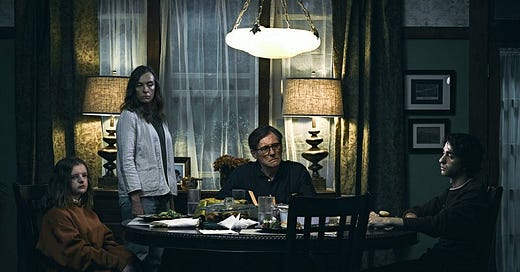We need movies like Hereditary (2018).
I was never into horror movies. I always thought they were unnecessarily violent, absurdly unrealistic and laughable, or both. To be fair, I was always a sensitive person and big, unexpected turns of horror always shocked me to discomfort.
It wasn’t until I learned that horror movies allow us to experience and confront existential anxieties and terrors without the necessary baggage of having to be self-aware of them, that I could appreciate them.

To me, Hereditary (2018) confronts the feeling of being cursed or damned to something. It confronts how our roles in our families often bind us to contracts, to horrendous sequences of events that — shockingly– unfold in systematic or even, in retrospect, predictable, ways, that we never even get a chance to consent to. In this way, Hereditary explores the conundrums of agency as they come up when being a member of a family — the conundrums of “inheriting” baggage and obligations.
For example, you may be the son or daughter of a parent who experienced trauma and suffers from PTSD. Your exposure to your parents’ PTSD, and the many ways in which it affected their lives, likely informs your own perspectives and reactions to things. Even if you do not believe in a Freudian-type of analysis, one could argue that the genetic predispositions that primed your mother to this complex disease are the very same predispositions in you, dormant and waiting to be ‘activated’ in the right, or even inevitable, context.
Similarly, in Hereditary, Peter grows up with a compromised relationship to his mother. His experience in being covered in paint thinner is representative of the experiences a child undergoes when either witness to or affected by the actions of a family member dealing with mental illness. In this case, it is his mother’s, Annie’s, sleepwalking. And even though his experience may seem exaggerated and singular, it symbolizes the sort of childhood experience which can have long term consequences. For Peter, it means he never fully trusts his mother’s love in him, or even in his sister.
But it goes beyond this. This feeling of interconnected fates permeates nearly all of the characters in Hereditary. Annie’s mother, Ellen, seemingly sets the stage for the entire plot of the movie. Her private life and the eerie, unknowing, quality of her being are visibly disturbing for Annie to cope with, as exemplified in the beginning of the movie. Later, Annie reveals to a bereavement support group that mental illness plagues much of her immediate family.

source: https://variety.com/2018/film/columns/how-did-hereditary-get-a-d-plus-from-cinemascore-1202839120/
Is it then surprising that Annie’s husband, who is not genetically tied to her, is seemingly non afflicted by the bizarre machinery behind much of the plot? That he is only affected insofar as Annie and his children are affected, and that the destruction of his character only comes at the hands of his wife? And what is one to make of how Charlie is also equipped with a knack for artistic expression, when her mother, Annie, is a miniatures artist?
Notwithstanding the unfolding illness that seems to sweep Annie’s entire bloodline is the question of female versus male sanity. Ultimately, it is the women in Annie’s bloodline who are beheaded, and Peter, a male, who is brought to initiation as a host to this demonic and spiritual illness. The image of the beheaded woman is not unique to Hereditary. It is seen across cultures and times and conveys how powers of thought, powers of agency and rationality, which are seated in the mind and the brain, must remain in the seats of men alone.

source: https://nerdist.com/article/hereditary-ending-explained-paimon/
Hereditary mental illness and familial patriarchy are such heavy topics that they are only ever discussed as part of the explicit “conversation,” the conversation that takes place between news stories, opinion pieces, and heavy-handed media that often makes explicit these issues. What movies like Hereditary allow us are glimpses of the experiential and more diffused nature of such lofty and timeless issues, in a way not so dissimilar to how they are actually played out in our everyday lives.
Without being prompted to be conscious of these topics as, in fact, topics, viewers can process such issues subconsciously and without conceptual or cultural attachment. Viewers can uncover for themselves what their raw and unscripted reactions and feelings are. For whom do they really feel sorry; do they find themselves blaming any individuals for what takes place? What conflicting feelings arise, and why?
I know for myself that answering these questions honestly, for the characters in Hereditary, unveils a darkness I would never otherwise admit to.



